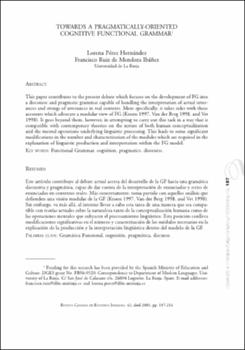Towards a Pragmatically-Oriented Cognitive Functional Grammar
Fecha
2001Resumen
Este artículo contribuye al debate actual acerca del desarrollo de la GF hacia una gramática
discursiva y pragmática, capaz de dar cuenta de la interpretación de enunciados y series de
enunciados en contextos reales. Más concretamente, toma partido con aquellos análisis que
defienden una visión modular de la GF (Kroon 1997, Van der Berg 1998, and Vet 1998).
Sin embargo, va más allá, al intentar llevar a cabo esta tarea de una manera que sea compatible
con teorías actuales sobre la naturaleza tanto de la conceptualización humana como de
las operaciones mentales que subyacen el procesamiento lingüístico. Esta posición conlleva
modificaciones significativas en el número y caracterización de los módulos necesarios en la
explicación de la producción y la interpretación lingüística dentro del modelo de la GF. This paper contributes to the present debate which focuses on the development of FG into
a discourse and pragmatic grammar capable of handling the interpretation of actual utterances
and strings of utterances in real contexts. More specifically, it takes sides with those
accounts which advocate a modular view of FG (Kroon 1997, Van der Berg 1998, and Vet
1998). It goes beyond them, however, in attempting to carry out this task in a way that is
compatible with contemporary theories on the nature of both human conceptualization
and the mental operations underlying linguistic processing. This leads to some significant
modifications in the number and characterization of the modules which are required in the
explanation of linguistic production and interpretation within the FG model.





